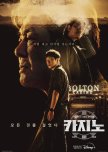
Casino-gangster-crime atmosphere with an exotic ambiance. International style. Takes its time.
"Big Bet" was inspired by the legendary persona of a South Korean casino manager who made it to the top of the multi-billion dollar casino world in the Philippines... until he was framed for murder."Big Bet" is another KDrama that has been divided into two halves in streaming provider style. (Unfortunately, this is kind of becoming the new KDrama fad and I'm already bored to express my anger about it.)
Oh yes, and I'll say it in advance: if you're interested in the series because of Son Suk-ku, you'll have to stick with it for quite a few episodes - he doesn't appear until the end of the first season...
The Disney production deliberately presents itself internationally. Nevertheless, one gets some atmospheric, socio-historical milieu impressions from South Korea - especially from the 1970s and 1980s, because the story is repeatedly enriched by flashbacks. (In fact, the first season is almost one great flashback - with flashbacks within that flashback, so to speak.) While the first season is designed primarily as a character study of Cha Mu-sik, the second season arguably has the real crime thriller behind it. Topic: Murdered South Koreans in the Philippines and the associated dynamic between the South Korean-born, now renowned casino manager, who has now become a murder suspect, and the investigator Oh Seung-Hoon, who was sent to the Philippines from South Korea. So the actual "big bet" only really becomes an issue in the second season.
So what does the first season have to offer?
Plenty of impressions of Mu-sik's childhood days, youth (wonderful: Lee Kyu-hyung as a youthful Mu-sik - although eventually Lee Kyu-hyung has meanwhile left his youth behind him...) and of his first professional steps into Casino world as young adult. The protagonist has his own charm and amazing talents and so we experience Mu-sik, although he radiates some sort of unapproachable aura, as an authentic and fascinating man with plenty of heart and mind, with a quick grasp, good intuition, radical consequence and entrepreneurial charisma.
"Big Bet" is a Korean-American production. It is international in its self-image and presents itself as such. It is made by men and it is about men. About smoking men. Sweating men in suits. Men with tattoos, too. The man with the most screen time is “Oldboy” Choi Min-sik (from the acclaimed 2003 K-Movie). He plays his role effortlessly as a 30-year-old and almost 60-year-old alike (thanks to modern filming and image processing technology). For "Big Bet" he is back in top form after a decade-long break. All in all, in this KDrama we slide into a (conservative) world of men and gangsters. Their wives, if there are any, are at home with children and really don't know anything about anything. Exceptions are the wealthy, and due to her wealth influential CEO Ko (with a rather quick appearance but comparatively lasting impression: Lee Hye-young) and the young, by Korean standards sexually quite explicit, self-determined hotel employee Kim So-jung.
In the flashbacks, as I mentioned before, there is South Korea at times. Nonetheless, "Big Bet" is principally based in the Philippines. Filming there took about 3 months. This promises exotic local hue, although the focus is on the casino and hotel world - which in turn could somehow be anywhere. No expenses were spared with the casting either. Even the supporting roles were selected with care.
In short: "Big Bet" (Season 1) is a solid and ambitious character study of Mu-sik. His Story is told in a sophisticated way and staged well worth seeing. However, the series isn't really a KDrama-like KDrama. Anyone who likes a casino-gangster-crime atmosphere with an exotic ambiance will get their money's worth here. However, the story takes it´s time. It remains to be seen what the second half will come up with. I certainly have high expectation that "Big Bet" will even improve, now that Oh Seung-Hoon intrudes into Mu-sik's world with his investigations and thus will add further dynamic.
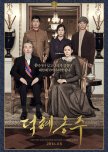
It is heavy opera. Nothing light-weight about it. And a rather outrageous (national) affront, too
"The Last Princess" is about Princess Deokhye, the youngest daughter of the 26th and last King Gojong of the Joseon Dynasty. The (sad) story is told in haunting images.
----------------------- SIDE NOTE: --- Historical context of Princess Deokhye ---
Under pressure from Japan, in 1907 the King had to abdicate in favor of prince Sunjong. Princess Deokhye herself wasn´t born at that time, but five years later, in 1912. The former king was then already 60-year-old. Being the daughter of his concubine, Deokhye initially received no official status as a princess. Yet she was very much loved by her father. However, the still young princess had to leave her parents and country at the age of 13 and grew up as a hostage in Japanese exile...
---------------------------------------
In taking on the princess´ story, the KMovie is simultaneously portraing a truly gloomy chapter in Korean history. Thus the movie itself makes you feel not only sad but even angry at times. One could say, the plot is about ´makjang´, written by history itself.
Although the historical facts are mixed up with a bit of poetic freedom, this (in my opinion) doesn't detract from the authentic circumstances of the Korean people being oppressed by the Japanese at that time. The producers of the KMovie have been accused of portraying the princess (despite her mental instability) in an overly sympathetic attitude towards the Resistance. Additionally her supposed engagement obviously was fictionally romanticized and falsified for the smoothness of the plot - on the other hand historiography doesn't know everything and why not fill the gaps with life by your own imagination und thus get a lively look&feel of almost forgotten times...
In any case, via the horrified eyes of the princess you will experience what colonialization might have felt like. There is plenty of heart and soul, as Son Ye-jin splendidly brings the tragedy of the princess back to life - with all her traumatization by the numerous personal blows of fate and forced by the historical circumstances of her time. Eventually, the movie brings this traumatic past vividly back to memory for those who experienced it themselves, and closer into the consciousness of today's society as well.
In short: It is heavy opera. Nothing light-weight about it. Nowhere. It is confronting the audience with a rather outrageous national affront. The movie want´s you to make a stand. And it actually succeeds in emotionally catching your compassion.

With "My Secret, Terrius" the KDrama-World shows what it can do, too: simply entertain.
"Terius Behind Me" playfully and lightheartedly balances between RomCom and spy thriller. The series dates back to 2018, but in view of the global corona pandemic, it is probably more up-to-date than intended. That makes the spy story a bit very serious in retrospect. Otherwise, "My Secret, Terrius" is a bit funny - the investigations and relationship dynamics intertwine in capricious ways. It's a bit cute - with the two twins as well as a second "romance" in the subplot. A bit tart - the legendary star spy undercover as an inexperienced babysitter for two bright six-year-olds. Between the two main leads, it's actually a bit about romance, too. But there is also room for a bit of bromance - male friendships. And there is a little something in it for handbag freaks.An exclusive highlight in "Terius Behind Me", however, is the Korean style neighborhood watch - the distinctive esprit of the mothers' association of the Kingsman neighborhood, that is characterized by notorious curiosity (by the way, a man is part of that, too). As the Kingsman Information System (KIS), they prove to be several times superior to the National Intelligence Service (NIS) - especially in terms of efficiency when it comes to their high-tech networking and highly motivated investigations.
In passing, you also gather some impressions of life in typical high-rise condominiums in Seoul´s new development areas, the over-committed mothers in such neighborhoods, and (in case I didn´t already mention it before)... handbags... :-)
With "My Secret, Terrius" the KDrama shows what it can do, too: simply entertain.
Enjoy.
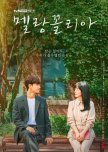
Richly layered. Excellently staged.
"Melancholia" is silently impressive. If you're just looking for a sweet romance, you'll be disappointed. Still, the story is a tribute to love. It's also about school, education, South Korean madness about education and the market around it, the arrogance of the top 10 percent of society, as well as bullying and intrigues for optimal certificates. Altogether it´s ambitious in several respects."Melancholia" is about the love for mathematics. Mathematics is for the protagonists what notes are for music lovers or colors for artists: a way to capture and express the beauty behind the beauty of life and the aesthetics of life on this planet. In "Melancholia" there are two people (and actually two more) who recognize this beauty with their mathematical 'sense organ', feel it deeply, understand it, and want to delve even deeper - thus see and meet each other and understand how they feel inside.
"Melancholia" refers to "Melancholia I" - one of the three master engravings by Albrecht Dürer - mentor and student look at it together in the context of the story and communicate about it, understand it, and doing so get closer. The Dürer artwork is an allegorical composition peppered with geometric elements and symbols. There are a wide variety of interpretations in the professional world. The two protagonists in the KDrama are inspired by this and enthusiastically help interpret. In connection with "Melancholia I" by Dürer, his sentence "But I don't know what beauty is" has also been handed down. This creative crisis, through which every creative person (whether mathematician, artist, etc.) has to go through at some point, is processed in the KDrama in its own way - in the first half the male protagonist and in the second half the female protagonist is struck by this question. Individually both are thrown off track and have temporarily lost sight of their joyful creative power. They inevitably stand in the face of melancholy - to some extent a dark, black tunnel, that opens up the passage to a new, luminous dimension of their creative power.
With regard to the student, the first half of "Melancholia" focuses on a variation of Weltschmerz, which is at the same time an expression of suffering from the beauty of the world. The protagonist can't help but see this perfection of aesthetics in everything everywhere. And yet he is alone in this. He cannot convey his perception, cannot share his experience with his fellow human beings. That's way too high for the others. Family, friends and even some teachers cannot relate or really understand what he is about. Some of his classmates may misunderstand him as a show-off and envy his genius. In fact, he suffers from the loneliness in which he is stuck. Not the beauty of the world. Yet all this changes after he meets a mentor who in the face of his 'brilliance' isn't (like many others) out for her own gain. Rather, she recognizes his rare ability of perception and gives it a grounded direction. She did not promote the genius, but the human being, who should not exploit his talent, yet learn to enjoy it. The mere experience that he is not alone with his way leads him out of his suffering. This is how he finds his place in the world and no longer has to withdraw and hide from it.
However, "Melancholia" also shows the mentor as she herself is stuck in an aloof, depressive phase. The motive is the same: also lonely, isolated, trapped in her feelings that she cannot share with a world that cannot understand her. And this time it is her student who can remind and encourage her to step outside and back into the world.
"Melancholia" is a hymn to higher mathematics, with which the beauty of life finds an abstract form(el) - but also to art, which tries to aesthetically translate the formulas and mathematical knowledge into new colors and new forms.
"Melancholia" is a homage to the love between two kindred spirits who recognize each other in their kinship and can't help but love each other (selflessly and unconditionally).
But "Melancholia" is also one of many stories in the shade of a brutal South Korean education industry that unscrupulously rides on the hopes, fears and worries of parents and students and repeatedly bears the bitter fruits of bullying, abuse, meanness, despair and fraud produces. In this context, a variation of it is once again told in an exciting, at the same time moving and excellently staged manner.
Finally , this story of the two main protagonists is both a new edition and a contemporary free reinterpretation of the relationship between of two historical mathematicians: the Tamil Srinivasa Ramanujan and the British Godfrey Harold Hardy. The KDrama refers to the extraordinary, intuitive mathematical skills of the historically real Tamil math genius, who was professionally recognized and promoted by the British Hardy. In 1913 Ramanujan came to England under the wing of his mentor and subsequently became known for several important discoveries. It is said that when asked what his own greatest contribution to mathematics was, Hardy said without hesitation that it was (his mentoring for) Ramanujan. He described their relationship as his only romantic experience in life. And with that he refers first and foremost to the very special form of eroticism of their shared, highly concentrated, soaring flights of intellect. Anyone who has never had this experience of a shared 'Eureka' will probably struggle with the romance aspect of this KDrama. Everyone else might experience it differently... .
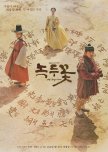
Fight for human rights. A story written with the blood of latest Joseon history. Highly valuable.
Definitely worthwile! "Nokdu Flower" offers a historically remarkable epic with a strong performance. The KDrama excels sort of. It almost seems as if the entire team was all too aware of the ambitious challenge to adequately capturing this short but crucial sequence of Korean history.In the second half of the 19th century, exploitation, famine, a corrupt, incompetent government and weak kings had eroded almost all belief in the existing system, in aristocracy and administration. Then there was the opening of the country to world politics and trades, for which the corrupt Joseon also proved to be profitable. In this historical KDrama it's not so much about the political intrigues around the palace, but about the landowners, administrative offices and Yangban in the provinces as well as the rebellion of the desperate rural people, who simply can't take it anymore.
The struggle for democracy in Korean history, like elsewhere in the world, has been quite bloody. That was last in May 1980 in Gwangju, when the democratic aspirations of the people were brutally crushed by the military. This was so during the student independence movement in 1929 in the fight against Japanese oppression. And that happened in connection with the Donghak movement, too, which had caused quite a stir throughout the country between 1860 and 1894. "Nokdu Flower" is deliberately very close to the front lines of those uprisings for democratic reforms, which then had been for the first time organized on this scale. This forms the perfect background for dramatically intertwined relationship dynamics of two half-brothers, (whose father is one of the particularly exploitative provincial officials who bleed the people dry), as well as the daughter of a merchant, who is used to deal with anybody, even the Japanese, for high profit.
The road to democracy on the Korean Peninsula is definitely rocky. To this day, the reactionary forces are still strong. "Nokdu Flower", however, represents a powerful, unforgettable symbol for the spirited struggle for freedom. The Donghak movement is often seen as the first patriotic Korean movement, since it was also about counteracting the increasing e. g. Japanese influence. But more than a patriotic struggle, initially the Donghak movement was actually about an idea that is bigger than family of origin or nation: It's about basic human rights. (An idea that, not too long before that, had also stirred up the European continent)
Matter follows spirit. And this spirit was shaken up in the rural population of Joseon by a new religious movement: Choe Je-u (1824–1864) created a new faith in 1860: Donghak, which roughly means "Eastern Wisdom". Drawing from Confucianism, Buddhism, Taoism and Shamanism, it sees the divine spirit at work in human beings - in ALL human beings, without distinguishing between class or gender. Additionally, it sees the world as moving in cycles - with a whole new world just waiting ahead.
Nevertheless, it is blood that paves the path to a new era. Eventually, the results of the first Donghak peasant rebellion included a treaty. The "Gabo Reform" recognized the new religion, and among other things, the lowest classes were freed, widows were granted the right to remarry, and penalties for corruption and abuse of office were introduced. Unfortunately, there followed a second peasant rebellion...
This is a story written with the blood of latest Joseon history, sort of.
Overall, a highly valuable production.
--------------- BY THE WAY... ----------------------
...the traditional Korean national dish BIBIMBAP is closely linked to Jeonju and to the Donghak uprising. The heart of the rebellion was in Jeolla province with Joenju being the provincial capital. Among farmers who did not have the time to prepare countless side dishes, it was common to simply mix whatever there was with rice and spices. This food proved its worth, especially when it came to feeding the rebels in their brave fight for new values and a more just future.
... the TITLE TRACK is actually a popular folk song that goes straight back to the peasant uprising. "Nokdu Flower" actually means 'blossom of the mung beans', but here it refers to the nickname of Jeon Bong-jun, leader of the peasant rebellion.
"Bird, bird, blue bird,
bird, bird, blue bird,
Don't sit in the mung bean fields.
When the blossom falls
the farmer goes to cry.
Bird, bird, blue bird,
Jeonju Gobu Nokdu bird,
why don't you fly away
The pines and bamboos are green.
We thought it was summer
yet it's bitterly cold and snowy."
The blue bird refers to the Japanese - they shouldn´t have any business in Joseon and should go away. Joenju and Gobu are legendary places of the uprising. Nokdu refers to Jeon Bong-jun´s nickname and the riot. However, Nokdu, the mung bean, also refers to an important agricultural product and food. Falling blossoms indicate a bad harvest. The 'summer' stands for the first uprising, the 'cold winter' for the second. The song was probably born during the execution of the leader Jeon Bong-jun and has since become a nationwide folk song in several different versions.
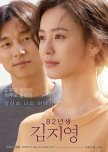
Showing simple normalcy for generations of SK women being gagged&bound by society's endemic sexism
"Kim Ji-young: Born 1982" puts every die-hard Korea fan through their paces: how far does the love for country and culture actually go? The KMovie also does away with any illusion surrounding romanticized and socially idealized yearnings that revolve around the concept of 'in love-engaged-married-happy family'."Kim Ji-young: Born 1982" broke the 2 million mark worldwide as a bestseller (by author Cho Nam-joo). It is also considered the most borrowed book in two consecutive years after publication. The KMovie was also extremely successful. In South Korea, between October 2019 and November 2020 around 3.6 million people went to the movies to watch. In addition, numerous prizes were awarded throughout Asia.
Calmly, unagitatedly and almost objectively distant, the camera focuses on the ordinary life of a typical South Korean woman, wife and mother in her 30s. Actually, she doing quite well. We accompany her in her everyday life between laundry and kindergarten, with her (actually quite attentive, loving) husband, with her in-laws, with her family of origin, with friends, with flashbacks of her childhood and at work, and finally with the therapist. This could all be any live of many a South Korean woman. That's not special at all. It's so cruelly normal that it even hurts. By showing simple normalcy, the story also becomes an outcry for several generations of women gagged and bound by society's endemic sexism.
Gagged and tied up by such a conservative, rigid, discriminatory socialization that is literally burned into flesh, so hardly anybody even considers alternative role models and self-images. There is a lack of role models that give women something like self-love and self-confidence that go beyond identifying with role expectations by family and society. Women somehow grow up as prisoners of those restrictive expectations - in a prison with doors, that technically are not closed, yet in practice barricaded by the mercilessly experienced sexism since early childhood. Accordingly, there is a lack of awareness of human dignity beyond gender roles. For women and men alike. And as we all know, such awareness would be the first path to any change...
In this respect, "Kim Ji-young: Born in 1982" holds up a merciless mirror in a calm, objective and non-judgmental manner, which focuses on the great evil that everyone simply takes for granted. Apparently, around 68 percent of cinemagoers were women. At least, the other 32 percent were men, supposedly.
In one of the last scenes, (which, like all the others in the film, gains its power from the simple, unquestioned und yet unbelievable normality) the underlying emotional muteness is finally allowed to speak up - not loudly and rudely though, but objectively subjectively and, despite all the justified anger, consistently in all modesty calmly, too.
In the face of the spilled coffee, instead of accepting the comments and accusations of her social environment with shame, concern and apologetic words, the FL has her outspoken objections. She eventually stands up for herself... actually, you should think, quite simply, as if it were a matter of course. And yet: downright unheard of. Because: Shameless in the best sense of the word... she no longer lets others shame her for what and who she is. She is slowly but surely developing a somewhat healthy approach to her own self-confidence as a person with self-worth and self-love beyond gender - a person who cannot be reduced by tradition to just a family concerned role concept within a hierarchical society. From this, the FL nurtures a new attitude towards those who traditionally believe they have more value in the social ranking.
Just a comparatively small, handy book; just a two hour movie. The story of Kim Ji-young, born in 1982, has sparked a lot of discussion throughout South Korea. The common, everyday (South Korean) madness shown knows how to touch and quietly infuriate. For me in faraway Germany, too, the KMovie wasn't boring for a minute.
-------------------------------------------------------
--- Outlook ---
'If everyone would act up like that... where would we end up?' - In this sense, the book and the film also led to a horrified outcry within conservative circles in the country. The main actors in the KMovie, for example, had to endure hateful comments for even taking part in it. Just this factual inventory of normal madness of just about every woman in the supposedly modern, innovative South Korea got conservative minds going...
...on the other hand, women affected finally received the balm of cross-class compassion, which for a moment opened up the space for solidary, cross-generational sisterhood. As insignificantly common and simple as Kim Ji-young, born in 1982, may be, the social impact was equally great - the consistently overlooked, completely disregarded reality that has been systematically carried out for countless generations out of principle and tradition, discrimination against (in this specific case) South Korean women.
South Korean society is already shrinking. Earlier than expected. And much faster than expected. No wonder.
Women born in the 1980s by now increasingly began to feel painful about their corsets. A milestone!
Those who were born in the 1990s and 2000s, some among them started to increasingly openly dare to actively shake up the social corset - simply by no longer accepting their 'certain' female role. Another milestone!
However, there is still a long way between shaking up and breaking out or even redefining. Eventually, women can only take this step together with men, who also urgently need to work on their role models, their attitude towards women and a new social self-image. Only then can the shrinking of South Korean society be stopped - a shrinking that, in my eyes, is an expression of a massive imbalance between innovative, turbo-capitalist high-speed in the global fast lane on the one hand, and an ignorant, sexist conservatism on the other, which acts like a lead foot screwed onto the brakes. Nevertheless, growing forces are apparently pushing for an urgently needed, integral, truly progressive transformation of existing values.

Although ´makjang´ was taking it almost over the edge of the bearable, I had to stick with it
A classic among KDramas. The dramaturgical moves may sometimes be predictable - the evil stepmother and such... However, there is this passionate play of truly dedicated actors . ...and a groovy interpretation of Ave Maria, that burns mercilessly into your heart and ear. Although makjang (Mean! Bitchy! Malicicious!) was taking it almost over the edge of the bearable, I had to stick with it. Some scenes still have an impact on me years later.Human abysses are presented in abundance. In addition, dealing with different facets of true love. An unforgettable piece of KDrama, for those who can never get enough drama. Here you can emotionally let off steam on the backs of the protagonists. For everyone else it might be a bit too much in some places.
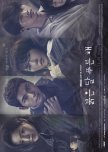
A strong production. A bold story that comes across without make-up by Korean standards
If you're looking for a KDrama of the usual type, then you won't find it in "Children of Nobody". Here you are dealing with an impressive psychological thriller with lasting influence that comes across without make-up by Korean standards. This is about child abuse. The powerful here are not the economic giants, but the parents in their sacred halls. Not funny. The story wants to stir you up and it does. In the original, the title is actually "Red Moon, Blue Sun" and alludes to modern South Korean poetry that has been quoted several times. In connection with the crimes against children, poetry seems downright paradoxical.If "Children of Nobody" at the time didn't make spectacular waves in the ratings, it's not because it wasn't done convincingly, but because there are a large number of unreported families in South Korea for whom physical abuse and the "stick of love" are still taken for granted. Sooner or later, these viewers would have to take a good look at their own noses. The topic is treated in a differentiated manner from a wide variety of perspectives.
----------------------------------------- SIDE NOTE: --- child abuse vs free, upright citizens ---
If people are broken mentally and physically from an early age, how are they supposed to learn to live as upright citizens? The road to free, responsible citizens still seems a long way off. 20/30 years ago in South Korea - without high technology, ubiquitous internet and social media - many people in their personal world largely only knew people for whom these practices of physical abuse were also a matter of course. The children and young people of today and the young parents of tomorrow, on the other hand, grew up in a time when they could learn a lot more about alternative living environments, value systems and educational concepts through the media. The field of consciousness is expanding. Conflicts with traditional structures arise. New perspectives are given space. In the exchange via social media, resistance and support can form, discussions are held and new values and self-images spread. Change becomes possible.
---------------------------------------------------------------
KDramas increasingly provide positive models of how things must become different in the future. In its own way, it tries to straighten things out in the context of child abuse that many take for granted.
Therfore "Children of Nobody" is a strong production. A bold story. A commitment to a future with free, responsible citizens - precisely because they are ruthlessly confronting with where society (in South Korea) actually stands.
Fantastic actors. Captivating story. Highly valuable.
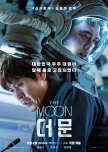
Filming standard à la Hollywood meets melodramatic narrative, emotionally firmly rooted in SK soil
“The Moon” could have easily been titled “The Dark Side of the Moon”. At least we as audience learn quite something about it... But it's actually about much more. The KMovie is delivering action within the high-tech world of space travel. On top of that it is touching, thought-provoking and thus gnawing at fundamental, existential and political questions, too. We get a remarkably balanced production between ´international´ filming standards à la Hollywood and a melodramatic narrative with its emotional roots firmly planted in South Korean soil. So eventually, this lunar expedition is neither/nor, as this KMovie offers something in between. For hard-core fans of Hollywood blockbusters it might be offering too much melodrama. For the hard-core KMovie fan it might not be enough. Well, I simply enjoyed it as the lunar expedition as it is.The focus is on the ambitious national program that South Korea has recently set up in terms of space research (you may check side note below). With its technological innovations, South Korea is starting to present itself as an increasingly self-confident G7 space power. That is where this story is coming from. And it is against this background that the particularly high level of filmmaking effort must be seen, by which the experience of space is brought almost hyper-real within the audience's grasp.
The special ambience is staged first-class thanks to the applied highly developed audiovisual filming technology and expertise. Seemingly, the production team has spared no effort or expense - with 3D rig camera recordings, premium HDR video technology, Dolby Cinema technology (for the first time in a KMovie), innovative spatial audio technology and sophisticated rendering processes for the finest color nuances. The demand was for high-end cinema quality. And it is surely impressive. Everything in this distant, highly technological, alien world, far way within the orbit of the moon, comes as close to the audience as it can get.
Despite the enormous spatial distance, dense emotional intensity is provided, even though the protagonists are located so far away from each other. This delicate emotional bridging, requiring high-end performance skills, has been the big challenge on the actors´ side. In addition to the proven, first-class veterans Sol Kyung-gu and Kim Hee-ae on the ground at the rather clinically clean setting with high-tech computers and screens of both Aerospace Centres Naro and NASA, especially Doh Kyung-soo (D.O.) offered magnificent top performance as an astronaut lost in space. Mainly those three create and maintain an impressively emotional density (in addition to the overall action).
The plot of "The Moon" revolves around South Korea´s international profile as capable space power, while the eyes of the world are set on their (fictive) second trial of a manned lunar mission. Whereas unfortunately it didn't work out the first time... It's also about politics and tons of money. And in the end, it's all about survival... or rather, whether a human's life in the face of groundbreaking missions for humankind is worth ignoring chains of command, nationalities and costs.
Breathless action on unusual terrain. Intense scenes in an isolated space capsule 380,000 km away from earth, surrounded by darkness and severe cold. Desperate helplessness. The struggle for the 'right' decision – what´s actually the measure of what is right? Maybe ultimately just what I can live with in the end?
----------------------------------------------------------------
SIDE NOTE: --- KSpace ---
Korean movie oder drama productions set in space have so far been few, and for good reason. The KMovie “The Moon” from 2023 as well as i.e. the KDramas “The Silent Sea” (from 2021) and “Ask the Stars” (planned for 2023) are, so to speak, a start. They reflect current (or better: hoped for further) developments regarding KSpace.
After rather unsuccessful endeavors at the beginning of the new millennium, South Korea as the 13th country to have its own space center by now, is increasingly well positioned in the KSpace segment. 2021 was marking the first attempt to launch their own test satellites into the orbit by their launch vehicle Nuri, which had been developed over the past ten years. Yet it failed. Nevertheless, in 2022 and 2023 it succeeded at last. Three more Nuri launch vehicles are already scheduled to be launched into orbit by 2027. According to the plans of the country and the Korea Aerospace Research Institut (KARI) at Naro space center, South Korean spacecraft will be collecting data on the moon in 2032 already. Additionally, the country has Mars scheduled for 2045.
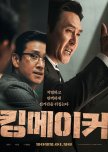
Political thriller, eloquently dealing with SK´s struggle for true democracy. Inspired. Profound.
Election campaign is a fight. But what rules should be applied? Do you inevitably have to hand in your ideals and ethics at the entrance as price for political success?Critical processing of South Korea's recent past - the democracy movement - is still in its infancy, because the dictatorship just finished a few decades ago and its proven structures within conservative circles are still resonating today. Increasingly, however, this topic is also taking up its media space. The political thriller "Kingmaker" sets a bold milestone by taking on a dazzling, comparatively upright, almost exemplary political personality, who for a long time seemed to have no chance in his sincere, ambitious fight for real democracy: Kim Dae-jung. He was the first opposition candidate to be elected President of the Republic. He is also the only South Korean to ever receive a Nobel Prize for his work on democracy and human rights. Some call him the Nelson Mandela of Asia...
In particular "Kingmaker" tells (in the plot prepared with some poetic freedom) about the early years of his political struggle and the arduous path that ultimately led him to the Blue House. The focus is less on his biography and more on what he still stands for in the eyes of most South Koreans today: real democracy. Or rather, against what he wanted to compete: the conservative, elitist, political cronies who stand in the way of progress and justice, if it is not in their own interest.
In the service of the electoral success, Kim (like so many politicians on this planet) was probably tried more than once to sanctify the 'good' purpose in the sights of many a morally questionable means. This difficult balancing act between an upright political attitude and one's own venality in a pact with a promising "devil" is illuminated and processed here in an impressive way. The temptation of a promising shortcut to success usually comes with a price that has to be paid sooner or later. (The internal struggle of 'for' versus 'against' shapes the decision-makers in South Korea with their well-established, conservative, shadowy networks to this day. This is actually writing daily history. And the TV and movie productions are full of it, too.)
The status quo - submission to the apparently influential 'more powerful' - is contrasted with a historically real personality. In order to convey the emotional dilemma in a dramaturgically clear way, Kim's campaign strategist of the first hours, Eom Chang-rok, was stylized as the main character and staged fictionally. In fact, little is known about him other than that he is said to have been brilliant and downright genius.
The story is about Eom Chang-rok's intelligent crisis interventions, solution approaches and election campaign strategies, some of which are in stark contrast to Kim's idealistic democratic values, that are always geared towards serving the people. The audience is confronted more than once with the question of whether the end might justify the means. Isn't the power of the people just a well-meant illusion after all? Wouldn't it be more efficient for the state leadership if a few (more or less) smart people decided for the many others in a short decision-making process? "Kingmaker" touches the foundations of political morality and ideology.
However, the KMovie also touches on very human weaknesses: the need for approval and the temptation to be seduced. These weaknesses are truly human and have to be dealt with by everybody - somehow, someday.
"Kingmaker" is a moving political thriller set in recent South Korean contemporary history about the stumbling blocks and challenges of true democracy. A democracy, that requires responsible, mature and accountable citizens. A democracy, that will always be challenged by the forces and networks operating in the shadows, whose goal is to incapacitate the citizens and instead rule for their own personal benefits.
An unpleasant subject, indeed. Yet the KMovie is eloquently dealing with this crucial issue for any democratic society.
A brilliant approach to this topic as well as to a younger chapter of South Korea´s history.
Inspired storytelling.
A profound production.

Mature romance, yet balanced with the eternal youth residing in the feeling of falling in love.
"Second to Last Love" is processing the topic 'getting old in South Korea' in a playful, sometimes profound, sometimes tender way. 'Old' means having exceeded 40. An 'Ahjumma' can be a swear word for a South Korean woman. Also ´Ahjussi´ for a man. In German it would probably be comparable if the casual 'Du' among around +/- 30 year old people suddenly became a 'Sie' - then you know: now I've fallen out of the '+/- same age'...In South Korea, a large percentage of life revolves around looking good and looking young. Marriage is also a big topic - wedding photos are always placed accordingly large and dominant in the house or apartment. The family ultimately forms the meaning of life, so to speak, if you follow in the footsteps of tradition. In case you stick to this standard - look good, marry well and take care of an honorable family - then everything is fine. Just one step to the right or left of the path creates social turbulence. Women (and men too) must be prepared and able to stand this. The issue will come up more or less confrontationally on every occasion.
This South Korean peculiarity is the starting point for many a KDrama. In "Second to Last Love" as well. However, this story chooses its own fine style and an almost progressive approach to it. Age and age differences in partnership are brought up again and again in several respects. Likewise, married vs. unmarried. Not only the conservative, but also somewhat more free-spirited perspectives and opinions are interspersed in a refreshingly good mood.
While the female protagonist is a career woman and single, the male protagonist lives as the head of a patchwork family. His wife died long ago, as did her fiancé. (Not that they didn't want a partner...) They've both been living their particular single life-style for decades by now and have gotten used to it. They no longer expect anything to change. This is where the KDrama comes in and tweaks a few dramaturgical adjustments in order to shake them both up and question their lives, their life plans, their longings and decisions. They may be 'old' in the eyes of society, but their lives are far from over. And THAT is the key point! There is still time and space for new decisions, for change, even for a second love in the last half of their life. Apart from aging, "Second to Last Love" is also about taking responsibility for one's own life and one's own decisions, including new ones. Despite all the depth, which it doesn't shy away from, the KDrama also has a touch of humor overall.
The protagonists´ 'grown-up' relationship is so delightfully mature and refreshingly grounded. Kim Hee-ae and Ji Jin-hee embody this adult maturity successfully balanced with the magic of eternal youth that resides in the feeling of falling in love. Their rapprochement, their feelings for each other and their attitude towards the other form a pleasant contrast to the more enthusiastic youthful forms that the protagonists are also confronted with...
The story is embedded in a picturesque, idyllic landscape and also allows a look behind the curtains of KDrama industry. The plot and its difficult issues - 'aging' and 'taking responsibility' - are rounded off by a few secondary plots within the patchwork family and work colleagues. A bit of intrigue should not be missing either. Last but not least, and above all, there is the romance, which despite the obstacle-filled terrain unerringly and sensitively paves the way between the two protagonists...
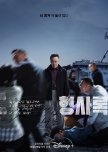
Solid crime drama! Gripping! About an aged, cynical cop struggling in a dark, grim man's world
"Shadow Detective" offers solid crime thriller quality at a high level - gripping, dense, with South Korean Look&Feel!As a Disney production, the series was produced explicitly for the international streaming audience. Accordingly, within compact 8 episodes the KDrama presents itself rather slim in terms of some characteristic dramaturgical, Korean-style storytelling elements. Nevertheless, a profound script, the committed cast and witty camera manage to create an enormous intensity and three-dimensionality.
"Shadow Detective" takes the audience firmly by the hand. The story does not have to come up with an excess of violence (as is so often the case with international, more masculine orientated streaming productions). I should mention, though, that it's primarily about older men in a man's world - and it's rather dark, grim, cynical.
Against the almost self-evident background of an almost unassailable, corrupt shadow world, the story focuses on the protagonist's inner struggle to do a reasonably good job as a detective despite the ailing system (... and to cope with aging).
Another season has already been announced.
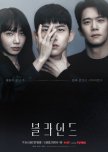
Exciting, yet gloomy thriller. The murder case being tried by a jury is just a kick off for more…
"Blind" is a fabulous, exciting, somewhat dark thriller."Blind" weaves its fictional story around 'survivors' of brutal child abuse and severely traumatizing exploitation as kids. These 'survivors' meet each other and their perpetrators 20 years later as adults. Each of those involved tried in his/her own way to come to terms with the past and lead a more or less normal life. Not only the abusive childhood, but also its psychological effects on their later life are a severe issue - and become a topic here. In addition, in this context complex interdependencies between the perpetrators of the time are dissolved and - against the background of a brutal variant of public vigilante justice - the original roles as perpetrators and victims are turned upside down.
"Blind" is haunting. The focus is on a murder case that is being tried by a jury. More murders follow. The dramaturgical setting is to some extent perhaps a bit reminiscent of an Agatha Christie novel - insofar as suddenly almost everyone in the case-related group of the selected jury could be the perpetrators... the distribution of roles between judges, investigators, victims and presumed suspects is also becoming increasingly opaque and fatefully intertwined. To pretend that one can turn a 'blind' eye to what used to be is no longer possible. Everyone must now look at the past and (even if it is perhaps a little late) bear the consequences. Magnificent.
----- SIDE NOTE: ---Child abuse - a sad and highly topical issue in South Korea ---
The thriller obviously saddles its story on the unspeakably sad topic of child abuse, which due to its unbroken topicality has increasingly made it into South Korea's series and film productions of recent years (among others "Children of Nobody" and "Mother" as drama or "Miss Baek" and "Bring me Home" as movie.) Many a well-established member of society prefer to look the other way when unbelievable deals are being made concerning minors, as long as they might even benefit themselves. And any 'survivors' can be glad if they manage to split off the traumatic experience to some extent - nevertheless most often PTS comes right along. Usually, those ´survivors´ until old age are psychologically still stuck in that desperate helplessness and inner agony of the past.
A South Korean government study from 2021 reveals, that abusive trafficking in minors has been rampant and even increasing in recent years. There is an acute need for action regarding more effective education in all public areas - from prevention to investigation and criminal prosecution up to employee training. A big problem with this: usually police officers or other officials are directly involved and work together with the traffickers, who specialize in the ruthless exploitation of minors. If the children and young people survive this, the psychological consequences of these deeply traumatizing experiences will be very hard - if at all - to be overcome. They are left helpless at the mercy of adults (who actually should take good care of them) and utterly hopeless in the face of a society that turns a blind eye to their torment. The only thing that is left: feeling betrayed and/or obviously of no worth whatsoever...
--------------------------
PS:
It may be that in reality a larger task force would have been set up to investigate the serial murders of the jury members. In my opinion, however, the KDrama didn't take anything away from keeping the circle compact in order to tell the story in its essential entanglements in a powerful way.
P.P.S.:
At last, I don't want to leave a pleasant detail (I think) unmentioned. We have seen it so often in KDramas: within the social ranking in South Korea, the older colleagues are obviously allowed to rebuke the younger ones with a shove, a kick or a snap on the forehead. (In view of my German socialization background, that is unheard of, but ...) In "Blind" one can now observe (among other things) that a transformation in this natural ranking behavior may be starting to happen within the younger generation: a colleague police officer in "Blind" actually gives back to his colleague and stands up for himself. So far, I have seen this rather rarely, if at all. Until now, as a rule in comparable situations, the fist usually remained in the pocket. In the mass consciousness, KDrama is relating to, starting 2022 such physical rebuke might obviously no longer be tolerated as a matter of course. Stand-up-for-your-rights seems to/wants to become possible - like a wind breeze of change coming up within a hierarchical tradition since centuries chiseled in stone...
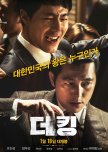
A man and his personal story of greed - leading into the repulsive quagmire of a corrupt network
In 2017, "The King" is among the top ten movies in South Korea. The story is a prototypical example for a few extremely powerful men(!) manipulating crime, business & politics within South Korean society. In an idiosyncratic style, the movie conveys an insight into an repulsive quagmire of corrupt networks that run through all social classes. It is about the particular imbalance in the realms of public prosecutors and judiciary, which in the 1990s and 2000s was still massively determined by bribery.The protagonist tells his personal story of greed (it is always people behind a system...) This is about his climbing to the top and the correspondingly deep fall. He accompanies the events from the off while the story unfolds before the eyes of the viewer in trenchant, impressive scenes. At first, you have to get used to this particular style, but the acting, pace, rhythm and camera nimbly catch the audience by the hand and won't let go until the end.
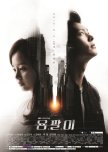
Idiosyncratic SK interpretation of a sequel to 'Sleeping Beauty' from the Prince´s perspective :-)
I would like to see the KDrama "Yong Pal" as an idiosyncratic South Korean interpretation of a sequel to 'Sleeping Beauty' in the modern zeitgeist, which is told from the point of view of the prince - what had actually happened after the two had celebrated their wedding at the time? ..."Yong Pal" gives its own makjang-infused answer several centuries after the Brothers Grimm :-)Obviously, the story also has a critical focus on recent health care topics. Basically, the Hanshin Hospital takes center stage. This belongs to a Jaebeol conglomerate. Yong Pal is employed here as a talented young intern. But Yong Pal also works illegally as a doctor. Provided the price is right, he treats those who need medical care below the official radar of the health care system. Yong Pal gets promoted as exclusive doctor for the discreet care of the VIPs, too. On the 12th floor, the very rich and most influential patients stay within a separate department of the Hanshin Hospital, where, in addition to plenty of luxury and discretion, only the best medical care is guaranteed. Towards the end, Yong Pal also works as a doctor in a simple, small, rural clinic. Thus, in the course of the KDrama the protagonist's field of activity (and challenges with ethics, or rather the lack of it) covers the broad spectrum and the current focal points of the topics in health care (i.e. in South Korea).
In the beginning, Yong Pal is clearly at the center of the story, captivating the audience. The focus shifts after he meets coma patient Han Yeo-jin and helps her to regain consciousness, strength and her rightful legacy as Jaebeol of the Hanshin Group. From then on, everything revolves more around Yeo-jin and her vendetta. This isn't less impressive, especially with Kim Tae-hee's intense acting. However it is different. The second part thus offers pure Korean-style Makjang: more drama is always possible. As a result, storytelling takes another lane. (Many viewers obviously don't seem to have been very happy with that. Makjang fans, however, will definitely get their money's worth.) The transition between the first and second parts is moderated by a transition, which is filled with the blossoming romance between the two protagonists. From then on, however, there is hardly any room for a love-life in the protagonist's bitter fight for inheritance and revenge, in which she is ready to take any means. (You may want to take that against the KDrama as well.)
All in all, "Yong Pal" is a moving story that is grippingly exciting at the beginning and furthermore tells of a makjang-charged revenge. Love story included. Due to the success of the series at the time of broadcasting, actually two more episodes were added.


 9
9 41
41 15
15

















